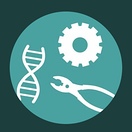Mammalian Cell Factories
We are very excited to explore new production ways of biologics using mammalian cells. Therefore, we are venturing in engineering the mammalian cells using novel CRISPR Cas9 technologies to boost the production while increasing cells’ performance and suitability to the bioprocess demands. We are also developing novel automated bioreactors to improve the growth of the mammalian cells using continuous production methods

